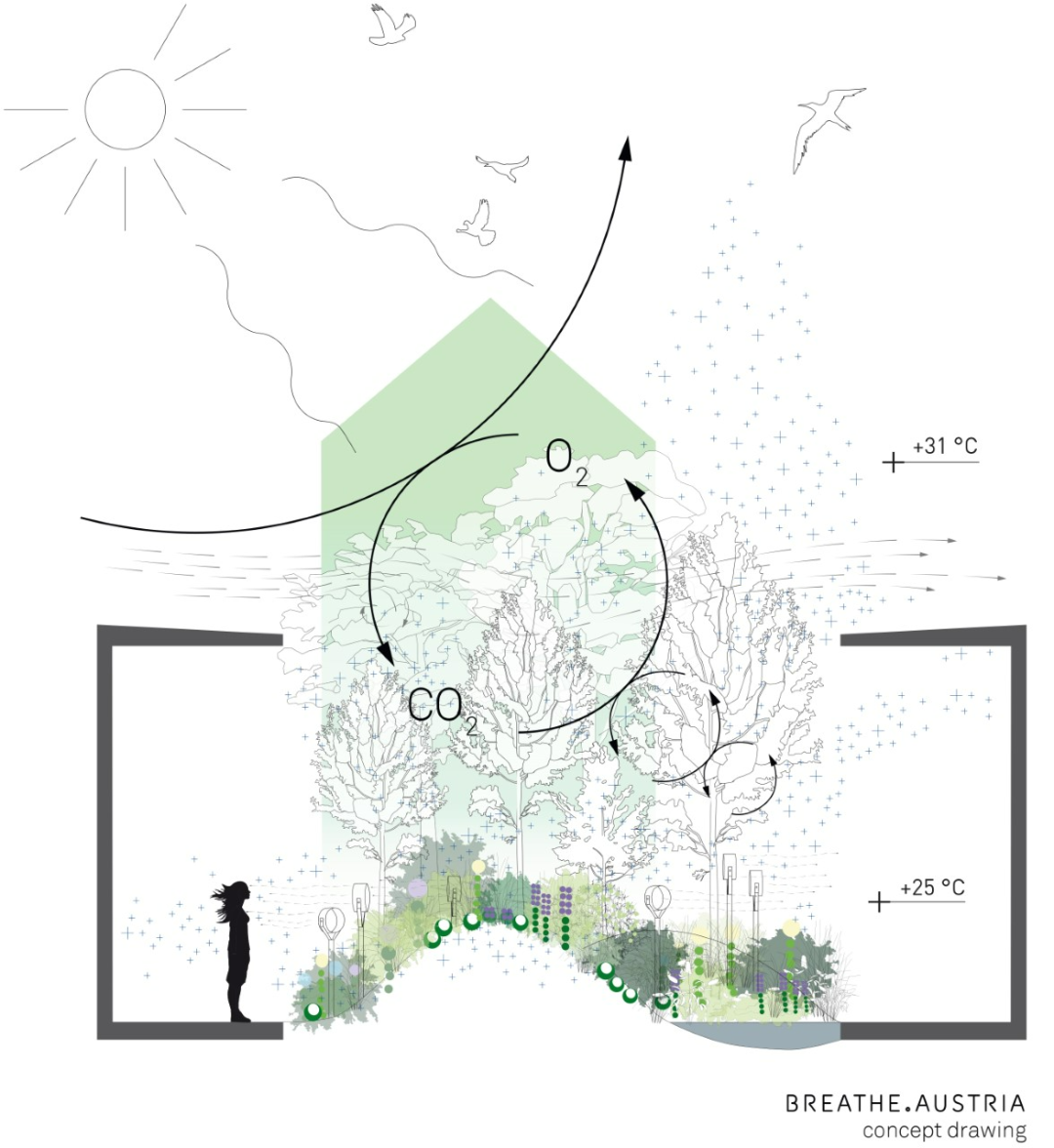

UIA × DigitalFUTURES
Design for Climate Adaptation

Image Credits: IA&L Institute for Architecture and Landscape, University of Technology Graz
TIME
Panel 1
Adaptation Through Indigenous Knowledge and Adaptation Through Frameworks
08 June / 5:00am - 6:30am, Beijing Standard Time
Zoom Link: 89317163433; Passcode: 804883
Panel 2
Adaptation Through Nature Based Solutions
09 June / 6:30am - 8:00am, Beijing Standard Time
Zoom Link: 89602208379; Passcode: 819048
Panel 3
Adaptation Through Behavior Change and Action
10 June / 5:00am - 6:30am, Beijing Standard Time
Zoom Link: 87001464924; Passcode: 920329
THEME
The Design for Climate Adaptation pre-event serves to generate interest and discussion around the theme of this year’s International Union of Architects conference: Sustainable Futures – Leave No One Behind. The Design for Climate Adaptation track emphasizes people, multiple forms of research, knowledges, and action. It seeks high and low-tech solutions to environmental and ecological design that make buildings, neighborhoods, landscapes, cities, and regions regenerative, resilient, and adaptive to climate change impacts. Methods for centering wellbeing, generating energy, harvesting rainwater, heating and cooling, purifying air and water, sequestering carbon, supporting biodiversity, and designing waste out of systems allow us to rethink how buildings, neighbourhoods, and cities are designed, operate, and contribute positively to the socio-ecological systems they are within.
Change over time, temporality, and future climate scenarios will be addressed by design for rising sea levels; increasing extreme weather events such as flood, drought, and wildfire; and strategic consideration for effective stormwater design, reduction of desertification, and protection of biodiversity. Beyond these direct effects of climate change, the indirect impacts of climate change will also influence the shape of future buildings, landscapes and cities. These include social and cultural change; changes to human migration patterns; changes to economic contexts; the urgency to decarbonise; and issues related to changing availability of resources.
Design for Climate Adaptation: Knowledge to Action aims to help humans adapt as effectively and appropriately as possible, in both technical and cultural ways by encouraging built environments to integrate with, regenerate, and become part of cooperative symbiotic ecologies.
Panel 1
Adaptation Through Indigenous Knowledge and Adaptation Through Frameworks
Albert Refiti
Indigenous Samoan
Auckland University of Technology, Aotearoa New Zealand
Adaptation with Indigenous Knowledges presents design-oriented scholarship and/or indigenous or local understandings and practices of approaches to climate change adaptation. During this panel, we will seek to answer the following questions: How can local and Indigenous knowledges shape, challenge, or improve our understanding of climate change adaptation through the lens of spatial design, planning, and ways of living in the built environment? What are climate adaptation-related concepts or projects led or challenged by Indigenous people and communities?
Albert Refiti Moderator, Associate Professor, Auckland University of Technology, Aotearoa New Zealand Amanda Yates Ngāti Rangiwewehi, Ngāti Whakaue, Te Aitanga a Māhaki, Rongowhakaata, Associate Professor, Auckland University of Technology, Aotearoa New Zealand Daniel Glen Crow Nation, 7 Directions Architects, USA |
Panel 2
Adaptation Through Nature Based Solutions
Maibritt Pedersen Zari
Associate Professor
Auckland University of Technology, Aotearoa New Zealand
“与自然的解决方案(NBS)相适应”模块研究了实现多尺度的气候适应和生态再生的方法。该模块将寻求回答以下问题:目前人们如何在建筑环境中与自然合作,并理解、融合和模仿自然,如何转变方式以适应气候变化?
Adaptation Through Nature-based Solutions (NBS) examines the means to achieve multi-scalar and interdependent climate adaptation and ecological regeneration. This panel will seek to answer the following question: How are people currently working with, understanding, integrating with, and/or emulating nature in the built environment to aid and transform efforts to adapt to climate change?
Ken Yeang Hamzah and Yeang Architects, Malaysia Kongjian Yu Professor, Peking University; Turenscape, China Barbara Norman Professor, Canberra University, Australia |
Panel 3
Adaptation Through Behavior Change and Action
Billie Faircloth
Research Director and Partner KieranTimberlake
Adjunct Professor University of Pennsylvania, USA
“结合行为改变和行动的适应性设计”模块研究了人类行为的设计策略,如何提升个人和社区应对气候变化?我们将探讨以下问题:建筑环境的设计如何促进、支持或挑战人类行为、价值观和合作过程以作为适应气候变化的手段?合作设计、参与式设计等创新设计和实践过程,如何倡导积极的变化?建筑、景观建筑和城市设计如何切实地展示和促进气候变化运动?
Adaptation Through Behavior Change and Action investigates design strategies that support or challenge human behavior and elevates individuals and communities that witness, are impacted by, and directly respond to climate change. We will explore the following questions: How can the design of the built environment contribute to, support, and/or challenge changing human behaviors, values, and processes for working together as a means of adapting to the impacts of climate change? How can innovative design and practice processes, including co-design and participatory design for climate change adaptation, make design more effective as an agent of advocacy and positive change? How can architecture, landscape architecture, and urban design tangibly demonstrate and contribute to climate change activism?
Klaus Klaas Loenhart Professor, Graz University of Technology; Terrain: Integral Designs, Austria Gail Brager Associate Director, Center for the Built Environment, Professor of Architecture, University of California Berkeley, California, USA Fabricio Chicca Senior Lecturer, Victoria University of Wellington, School of Architecture, New Zealand |
 ABOUT US
ABOUT US




